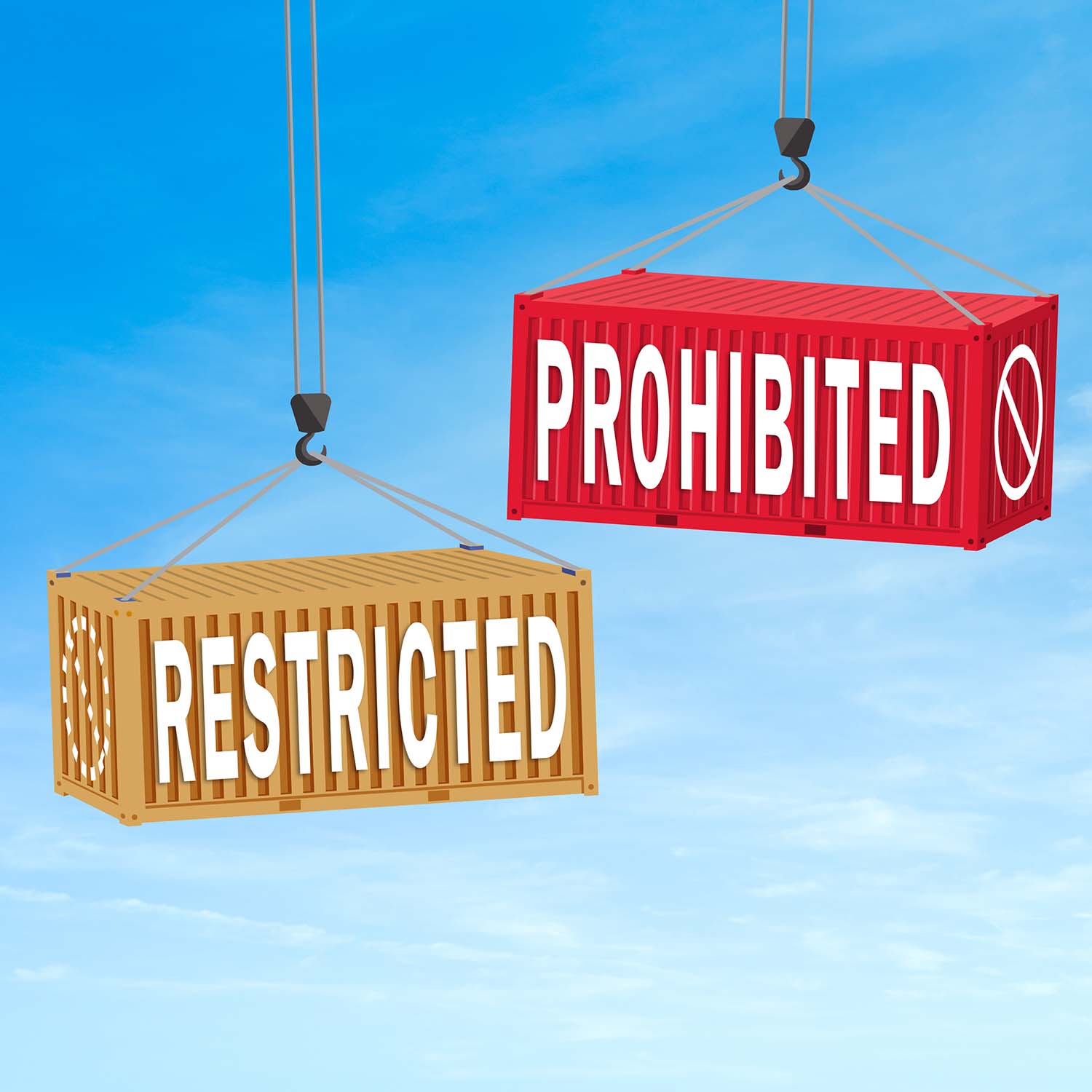Import: Restricted and Prohibited
Restrictions and Prohibitions
All countries restrict or prohibit the import and export of certain articles based upon:
- Concerns for health, safety, and public morality (e.g., foodstuffs, agricultural products, live animals, biologic materials, pharmaceuticals, illicit drugs, chemicals, hazardous products, and materials deemed indecent).
- Protection of the physical and economic security of the state (e.g., arms, armaments, dual-use technology, radio and television transmitters and receivers, radioactive materials, seditious materials, and currency).
- Economic protection or subsidization of domestic industry (e.g., non-tariff barriers to trade for imports and control of natural resources for exports).
- Enforcement of provisions of multi-lateral trade agreements (e.g., those designed to protect endangered and threatened species of animals and plants and those designed to protect copyright, patent, and trademark holders against infringement).
By Destination Country
In some cases, the degree of restriction depends on the destination country. This is true for dual-use goods, whether they are of civilian or military origin. Country-specific embargoes or moratoria may also be in effect and may be seasonal or of short duration.
By Quota
The import of certain goods is sometimes restricted by quotas, meaning the goods can be imported within the limits strictly set by the EU. An import license is required to import products subject to quotas. Examples of these products are industrial, agricultural, textile, and steel products.
Online Customs Tariff Database (TARif Intégré de la Communauté or TARIC)
The EU's online tariff database known as the TARIC provides up-to-date information on restrictions and prohibitions based on a product's tariff classification code and country of origin or destination. Economic operators should always consult the TARIC for the most up-to-date information, as import restrictions and prohibitions are subject to frequent change. The TARIC can be accessed at www.ec.europa.eu/taxation_customs/dds2/taric. (See the Duties and Taxes page for more information.)
Restricted Articles
Examples of products restricted from import into the EU and Germany are:
- Agricultural products (governed by the EU's Common Agricultural Policy or CAP)
- All goods subject to phytosanitary controls (plants and vegetable products, including fresh fruit and vegetables)
- Live animals, and foodstuffs and other products of animal origin
- Aquaculture animals and products
- Wood products (packaging, bark, chips, particles, sawdust, wood waste and scrap)
- Narcotic drugs and psychoactive substance, drug precursors, pharmaceutical products, and veterinary medicines
- Chemicals (regulated by Registration, Evaluation, Authorization and Restriction of Chemicals, or REACH, legislation), and ozone-depleting substances
- Pesticides and biocides
- Waste products
- Weapons, firearms and ammunition, explosives, and dual-use goods, and radioactive products
- Products that could be used for the death penalty, torture, or other cruel, inhuman, or degrading treatment (subject to licensing by customs)
- Tobacco products and alcohol
- All licensed goods
- Some iron and steel products
- Some species of fauna and flora threatened with extinction, regulated under CITES (the Convention on International Trade in Endangered Species of Wild Fauna and Flora), or products made from those plants or animals
- Diamonds and diamond powder must be processed and certified under the Kimberly Process Certification Scheme.
Batteries
Adopted in 2006 and last amended in 2013, the EU's Battery Directive applies to all batteries and accumulators placed on the market in the EU and European Economic Area. This includes automotive, industrial, and portable batteries. The directive seeks to protect the environment by restricting the sale of batteries and accumulators that contain mercury or cadmium (with an exemption for emergency and alarm systems, medical equipment, and cordless power tools) and by promoting a high level of collection and recycling. It places the responsibility on producers to finance the costs associated with the collection, treatment, and recycling of used batteries and accumulators. The directive also includes provisions on the labeling of batteries and their removability from equipment. More information is available from the European Commission at www.ec.europa.eu/environment/topics/waste-and-recycling/batteries-and-accumulators_en.
Prohibited Articles
Some articles are totally prohibited from import into the EU. Examples of these include:
- Counterfeit goods and offensive weapons (as defined by the EU)
- Indecent or obscene publications, videos, and other articles
- Some or all products from Iran, North Korea, Myanmar, or Libya
Special Registration Requirements
AGRIM Certificates
The EU's Common Agricultural Policy (CAP) mandates that import licenses, referred to as AGRIM certificates, are required for food and wine products imported from non-EU countries into any country in the EU. A new CAP was formally adopted on December 2, 2021, and will begin being implemented on January 1, 2023.
Registration, Evaluation, Authorization, and Restriction of Chemicals (REACH)
All importers of chemical substances covered by Registration, Evaluation, Authorization and Restriction of Chemicals (REACH) must be registered with the European Chemicals Agency or ECHA (www.echa.europa.eu), if chemical substances imported into the EU are a ton per year or more.
Trade Control and Expert System (TRACES)
The European Commission's Trade Control and Expert System (TRACES) is an online platform for sanitary and phytosanitary certification required for the import of animals, animal products, food and feed of non-animal origin, and plants into the EU as well as intra-EU trade and EU exports of animals and certain animal products. The main objective of TRACES is to streamline the certification process and all linked entry procedures and to offer a fully digitized and paperless workflow.
Note: Import restrictions and prohibitions are subject to change. It is important to obtain the latest information from a customs broker, freight forwarder, the local customs authorities, or TARIC database at www.ec.europa.eu/taxation_customs/dds2/taric.
Sources: European Commission (www.ec.europa.eu); German Customs Administration (Zolldienststellen) (www.zoll.de)
Article written for World Trade Press by Brielle Burt, Jennifer Goheen, and Nina Bellucci.
Copyright © 1993—2025 World Trade Press. All rights reserved.

 Germany
Germany 